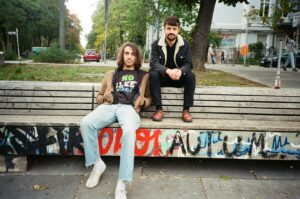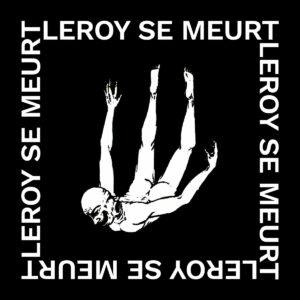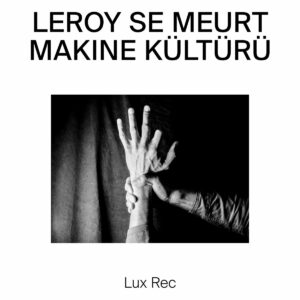Not so many bands have such as recognizable sound as French duo Leroy Se Meurt. Their records, quite habitual in Dead Violets Night’s DJ bag, can really penetrate your flesh thanks to their rawness and aggressiveness and their violent honesty. With only three EPs released, they have became one of the names to follow in the modern EBM scene. They will be playing at the Ombra Festival that will take place in Barcelona, on the 26th, 27th and 28th of November. Utterly unmistakable.
 —How did the two of you meet?
—How did the two of you meet?
—Volkan: We are actually longtime friends. We met in 2011 through Mathieu’s girlfriend. I was carpooling between Marseille and Lyon and his girlfriend was one of my passengers. I was driving and putting some music that I had on my iPod. Usually, people were not really reacting to the bands on my playlist. She told me right away that the music I was putting was the kind his boyfriend – aka Mathieu – was listening to. So days after we met and started hanging out together in Lyon and Marseille and finally got very close.
—The name of the band refers to Ionesco’s Le Roi Se Meurt, a play about a king who does not want to accept that he is going to die. Why did you choose such a name for your band? Do you think that becoming an artist is a way of trying to escape death?
—Volkan: There are actually two references: One to Ionesco’s play, yes, the second to an electric motor manufacturer called Leroy Somer, based in New Aquitaine. This industry used to employ a significant number of inhabitants in the region. As it is generally the case in France for industries, because of relocation and offshoring, the activity decreased to get to a point where it has been sold to several investors leading to numerous social plans.
Leroy Se Meurt refers to the death of the industry in France and Europe leading to social crisis. All taking place in a world of absurdity as Ionesco describes.
—Mathieu: To answer to the second part of your question, it’s true that putting out music is a way to escape death: music will still be around after you’re gone. But I don’t think it’s really something that you’re thinking about when you’re at home writing a track on your synthesizer. Even if I completely understand the wheel of immortality, I can’t help but thing it’s a bit too presumptuous and waaaaay above our humble work.
—Your music, especially in your first EP, could be considered violent and aggressive. Making it is a kind of catharsis for you?
—Volkan: It is definitely the case for me! It is a way to get out things/feelings that I would usually bottle up.
—Mathieu: Yep! It’s the case for me too. Catharsis doesn’t motivate me to put out tracks, but when we play live in front of an audience, I really experiment something unique, like being away from my self and release everything I usually contain. I guess it’s something I always had, from the first metal gigs I attended as a kid, to the strong club experiences I had more recently.
—In your second work, you slowed the BPMs a bit and tried to build tension in a gradual way. Do you think that the impact of the music can be stronger when it’s a bit more subtle?
—Volkan: There are different ways to impact I guess. Every time we release new material, we try to experiment and find new angles to express ourselves while keeping true to our style. The first EP was raw and a bit low-fi. For the second one, we tried to add more post-punk vibes to it and on the latest one we worked on more fast and electro hard beats.
—You sing in Turkish and French, how do you choose the language for each song? Have you tried to record the same song in different languages?
 —Volkan: There are actually no rules. The choice comes naturally I guess. Also it feels like I don’t sing the same way when it’s in Turkish or in French.
—Volkan: There are actually no rules. The choice comes naturally I guess. Also it feels like I don’t sing the same way when it’s in Turkish or in French.
We never tried recording the same song in different languages, but it’s a good idea that we need to experiment!
—Mathieu: Yeah, most of the time Volkan chooses in advance which language could benefit the song and we stick to it. I don’t exactly know why we choose one or another but a Turkish track is always very different than a french one. I guess tones are really different, plus the specific rhythm of each language produce very different results. I guess it’s a good thing, it adds some variety.
—What gear are you using for your music? Analog or digital?
—Mathieu: We’re not really surrounded by gear, we always work with the same staples: mainly Elektron’s machines, plus a Korg MS20 and a Malekko Manther. For our 3 released EPs, we use to record straight out of the mixer, but I now multitrack on Ableton Live. Of course you get way more flexibility this way.
—Your last work, Makine Kültürü has been recorded during the lockdown. Was it more difficult to work without being together? I guess that, at least, you had a lot of free time.
—Volkan: Unfortunately, because of my work, the first year of the pandemic was not so restful for me as I needed to work twice as much to set sanitary rules in my workplace. Mathieu definitely had more time for himself though haha.
We didn’t want to stop recording. And for Mathieu, this became a routine to make him pass time easily. The fact of being far from each other during several month made us readapt our way of recording. He was creating the whole instrumental parts and then was sending it in order for me to record the voices. I need to say that I had some troubles with my neighbors because of my continuous screaming and shouting. The process was very interesting as we were choosing independently the bias of our different parts.
—Mathieu: It wasn’t that difficult to work independently but it’s great to be able to work in the same place again. At least, during this weird times, we had the opportunity to discover a new workflow.
—The name of this album, Makine Kültürü, is Turkish for The culture of machine, a quote from Nietzsche “Reaction against the machine-culture.” Do you think that electronic music is the first step for the machine-culture?
—Volkan: Wow! You did your research! ☺
What I understood of Nietzsche’s text is that humans created machines with great powers but these creations were not pushing them to be greater, and worse, it was annihilating their ability to create art. I do not believe that though. Machines are just another tool in our life that assist us in different fields. In our case, musical expression.
I’m curious of Mathieu’s answer though, as him being a Terminator fan!
—Mathieu: Yeah, in a way I agree with Volkan. Computer or machines are tools, in the same way than drums, piano, or any previous musical instrument is a tool.
On the other hand, beyond the utilitarian point of view, the comfort of machines doesn’t push you up at all. He wrote this 150 years ago, before the industry, before cars, before computers and way before social network, and it’s truer than ever now.
About this quote and the link with electronic music, I think electronic music is just one of the soundtrack that reflect our current technologic world. As Throbbing Gristle said “Industrial music for industrial people”, you can say “Technological music for technological people”.
—You said that during the recording of this album, it was the first time that you worked with samples. Did you like the experience or do you prefer real instruments?
—Mathieu: Oh yeah, samples are cool. It’s a different material to play with but in our case, playing with a synth or a sampler is pretty much the same experience: you feed the machine with oscillators or previously recorded material, and you turn knobs and push buttons until it’s sounding good.
 —You have named as source for your lyrics Breton, Öktem and Khayyam… What do you look for with your lyrics? Do you think that it’s possible to dance and think at the same time?
—You have named as source for your lyrics Breton, Öktem and Khayyam… What do you look for with your lyrics? Do you think that it’s possible to dance and think at the same time?
—Volkan: These are poets that we read and admire a lot. Our lyrics are actually scrap wording of text we fetch in their works. More than the meaning, we are looking for the impact the words are having in a song. For me dancing is a way of liberating our bodies, our minds, it’s universal and could gather people with different thoughts.
—Mathieu: Yeah, Leroy Se Meurt is a question of sounds, not lyrics. Cutting up poetry is a good way to get good sounding words without meaning.
—In this new work, Mathieu said he wanted to add some acid elements, although I would say that even in the previous work there was a bit of that style. How do you see acid music in this decade?
Mathieu: This is a hard question for me, I discovered acid a few years ago and I only listen to parts of this huge musical movement. I really like the fact that almost everything considered as Acid music worships the TB303 but I don’t have enough culture to judge what we call Acid now.
—You have collaborated in the recent tribute to Absolute Body Control made by Oraculo Record with a song. Why did you choose that one? I guess you will try to see them live at Ombra?
—Mathieu: Yeah, this was a great experience ! Nico (from Oraculo Record) asked us which track we wanted to cover but our favorites were already covered by other artists, so he proposed “Into The Light”, from their 2010 album. It was a good pick, we really liked the idea and the result.
—Volkan: Yes! We’re looking forward seeing and meeting them. At the past Ombra edition we had the chance to see Dirk Ivens with his project Dive. It was amazing!
—Have you listened to the last album by HIV+? It’s a tribute to Artaud, an artist you have cited in some of your interviews.

—Mathieu: Yes! Definitively! As soon as I heard about this record, I’ve contacted Pedro (the man behind HIV+) to ask him if I can play a track in a monthly radio show I host with a friend in Paris. I played “Amour”, featuring Marc Hurtado, which was the first track I listened to and still the one I prefer now that I’m familiar with the record. It’s really a great piece of work, I’m sure Artaud would have been proud.
—The band has cited Le Syndicat Électronique as an influence. What do you like of the legendary French act?
—Volkan: Le Syndicat Électronique and his Label Invasion Planet are big inspirations in our work, yes. I guess it made us realize that simple electronic music can be that powerful.
—Mathieu: Yeah, it’s definitely one artist that gave me the urge to produce music. His style is pretty simple, repetitive and minimalist, but the result is something super powerful and mesmerizing. Leroy Se Meurt wouldn’t be what it is without the previous work of pioneer like him.
—What new EBM acts do you like?
—Volkan: I don’t know if we can qualify him as EBM, but we like a lot Cardinal and Nun, specially his last release is crazy!
—Mathieu: Yes, not the typical EBM one would think of, but I recently saw the record on the “Industrial/EBM” section of my record shop.
Otherwise, EBM artists I often play are: Kluentah, Volition Immanent, Kris Baha, Arabian Panther, Identified Patient, En Direct, Boris Barksdale, Maenad Veyl, Youth Code.
—In an interview you confessed to like Black Metal. According to you, what are the common things between a genre like this and with your music?
—Mathieu: Sound wise, not so much, but we both come from punk music and we share some common values, like the urge to create music even if you don’t know much about it, the DIY side of things, and a taste for simple, dark and repetitive music.
—Mathieu, you said in an interview that heaviness and repetition are the elements that you like in music and that punishment is what you are looking for. Is music for you the ultimate way of domination?
—Mathieu: Yeah, punishment through music is sometime a powerful experience. The ultimate way of domination? Definitively not, BDSM, social pressure or working at a factory 8 hours per day seems way more ultimate than a rave party. Let’s say it can be at the crossroad of art, party and punishment and it can be a way to enjoy discomfort.
—Volkan, what do you think of the Turkish Goth scene? Now there are some good bands in Turkey like Ductape, Affet Robot, Rain to Rust or She Past Away.
—Volkan: In the 80’s and in comparison with Greece, Turkey just passed by the whole Goth / Darkwave era. Nowadays, it is very pleasing to see that bands as She Past Away brought this genre there. I think their music and lyrics give an alternative way of thinking that speaks to a part of the Turkish youth. Eventually creating a new scene.
—Volkan, you also play in Hobby, a more indie pop band, right? What can you please tell us about it?
—Volkan: Hobby is a very different project than Leroy Se Meurt. I write the songs, sing and play the guitar. We released an EP last year on two labels Hidden Bay Records and rds rec. Hamburg.
I like to have different projects. Lastly, I started a low-fi bossa nova project with a friend. It’s always different dynamics and different way of playing music. I’m learning a lot!
—Volkan, did you also record an album called Rulo? And were you part of the jazz act Islak köpek?
—Volkan: It’s actually not me! Haha
It’s a musician that has the same name and surname as me. I noticed he was playing in Islak Köpek jazz act when I saw a video where a famous Turkish actress Serra Yilmaz (that I love) was featuring in one of their performances.
—How is going to be your concert at Ombra Festival?
—We’re super happy to be back on stage especially on such a great one! We’ll play a pretty raw set including some new tracks from our still in progress first album!




